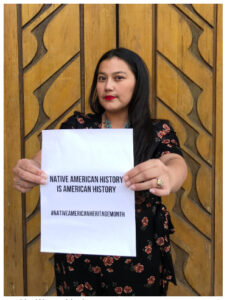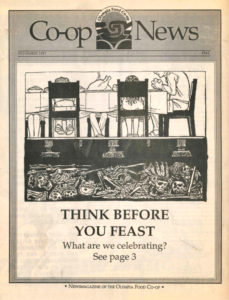Both Co-op locations will be open on
November 28th, 2019
8am – 5pm
The staff collective would like to recognize the diversity within our community. If you have thoughts on our store hours we would love to hear from you! Email here
A message from
Jaclyn Roessel
Director of Decolonized Futures & Radical Dreams
US Department of Arts & Culture
November 22, 2019
Growing up as a Diné woman, I was taught to carry on my cultural practices of reverence for land and place. I was molded by the beliefs, prayers, and encouragement of my parents and grandmothers, and was raised hearing stories of our creation—stories that relate us to the world around us. In my community, fall brings with it a full of appreciation of the harvest and new practices to welcome the colder months.
While this time is filled with reverence internally, outside of my community the fall season is also full of cringe-worthy debacles. Between the racist costumes that arise around Halloween, the offensive mascots that storm the field, and the continued perpetuation of the false history of Thanksgiving, this season is challenging as a Native person.
Since the 1990s, the federal government has declared November “Native American Heritage Month.” This year, however, the White House made another tactical effort to malign Native communities and Nations, proclaiming November as “National American History and Founders Month.” The announcement centers colonizers and “founding fathers,” invisibilizing the Indigenous people whose land was taken and the millions of Indigenous lives lost since contact because of genocide.
As Philip Deloria asks in his essay, “The Invention of Thanksgiving,” “how does one take on a myth?” At the USDAC we know that is not as simple as saying Indigenous peoples “are still here.” These times call on all of us to deconstruct the myths and falsehoods related to the “founding” of this country, and to work in active solidarity with Native communities. At the USDAC, we want to offer a few ways we might start.

Photo of Jaclyn Roessel by Warren Montoya
Start Conversations + Take Action
- Begin conversation around your turkey dinner this year. Use the USDAC’s #HonorNativeLand Toolkit to investigate whose land you’re gathering on and offer a land acknowledgment as a way of opening conversation. Discuss with your loved ones the history you learned or didn’t learn about Native peoples. Brainstorm together how can you move beyond acknowledgment and into allyship and action. Is there a commitment you can make together to learning more about the history of the Indigenous communities that have inhabited the land you occupy? Are there Indigenous-led organizations in your community that you can support?
- Understand that 100% of the land this country is on is occupied Native land. All. Of. It. In the video “The ‘Indian Problem’” Suzan Harjo shares, “There was no land brought here, the land here was Native Nations’.” She shares the power of myths and falsehoods and how critical they are to the continual dispossession of Native Peoples of their land.
- Join the movement to recognize Native American history as American History. This social media campaign is working to visually represent how there would be no American History without the Native American contributions, protection and stewardship of Turtle Island (the above photo of me is part of this campaign).
- Indigenous peoples and communities are on the frontlines of the protection of Earth Mother. USDAC, has been working to support Climate Strikes through the USDAC Bureau of Energy, Power, and Art. We feel strongly this intersection is one we will grow in the next year and encourage you to show up for the next Global Strike on Friday, November 29th.
When I dream of future worlds, I see one that includes and centers Indigenous peoples through a true telling of history, where Native sovereignty and culture is protected and Native land recognized and stewarded with respect. When you understand the history of this country and the treatment of my ancestors, you understand how truly radical this dream is.
Ahe’hee,
Jaclyn Roessel
USDAC Director of Decolonized Futures & Radical Dreams
Our Anti Oppression Coordinators have recommended the book,
500 Nations: An Illustrated History of North American Indians, by Alvin M. Josephy Jr.,
for staff to learn more about the history of Thanksgiving.
Starting on page 206, a beautiful story is woven of native homes, abundant food resources, spirituality, and a brief overview of the political structure of the many villages in the New England area. As the story continues, we learn the history of the beginnings of our Thanksgiving holiday.


